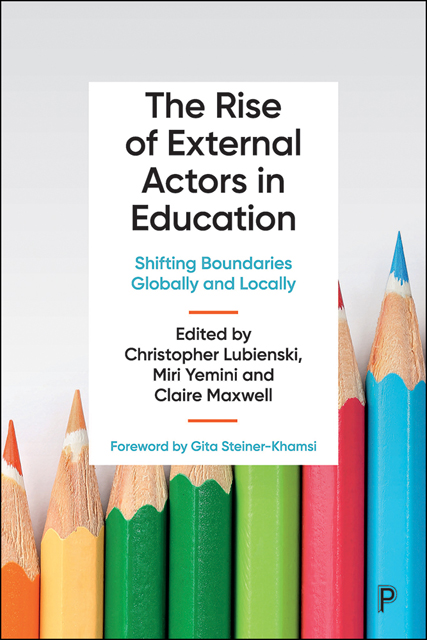Book contents
- Frontmatter
- Contents
- List of figures and tables
- Notes on contributors
- Foreword
- Introduction
- 1 Collective parental involvement: an in-between actor
- 2 When teachers become the external actor: private tutoring and endogenous privatisation in Cambodia
- 3 Cross-sectoral alliances in charter schools: the role of boards of directors from for-profit and non-profit sectors
- 4 A communitarian framework for understanding the relations between schools and NGOs
- 5 PISA for sale? Creating profitable policy spaces through the OECD’s PISA for Schools
- 6 Historical reconfigurations of internal/external actors in Danish educational testing practices
- 7 A short history of external agency involvement within education in contemporary Poland
- 8 New philanthropy in the heterarchical governance of education in Brazil
- 9 Venture philanthropy and the rise of external actors in Australian education
- 10 Power struggle in education policy change: the role of knowledge actors in structural reforms in Chile
- Conclusion: Complexity and intentionality of external actors in education
- Index
5 - PISA for sale? Creating profitable policy spaces through the OECD’s PISA for Schools
Published online by Cambridge University Press: 13 October 2022
- Frontmatter
- Contents
- List of figures and tables
- Notes on contributors
- Foreword
- Introduction
- 1 Collective parental involvement: an in-between actor
- 2 When teachers become the external actor: private tutoring and endogenous privatisation in Cambodia
- 3 Cross-sectoral alliances in charter schools: the role of boards of directors from for-profit and non-profit sectors
- 4 A communitarian framework for understanding the relations between schools and NGOs
- 5 PISA for sale? Creating profitable policy spaces through the OECD’s PISA for Schools
- 6 Historical reconfigurations of internal/external actors in Danish educational testing practices
- 7 A short history of external agency involvement within education in contemporary Poland
- 8 New philanthropy in the heterarchical governance of education in Brazil
- 9 Venture philanthropy and the rise of external actors in Australian education
- 10 Power struggle in education policy change: the role of knowledge actors in structural reforms in Chile
- Conclusion: Complexity and intentionality of external actors in education
- Index
Summary
Introduction
We find ourselves in a moment where the unprecedented need for, and generation of, performance data in education is drastically reshaping schooling. Alongside demands for increased accountability and transparency in public schooling, these data have produced new urgencies around finding ‘evidence-informed’ (Lingard, 2013, 2021) solutions to putative problems of policy and practice, or, put differently, to identify and implement ‘what works’ (Auld & Morris, 2016; Lewis, 2017a). This desire for solutions has produced a new market for policy populated by new providers of services, with efforts to identify ‘what works’ occurring in tandem with the increased presence of non-governmental organisations in education, both within and beyond the territorial boundaries of the nation-state. As such, powerful transnational private policy networks – which encompass intergovernmental organisations, for-profit businesses, non-profit agencies, and the philanthropic sector – now contribute towards a ‘global education industry’ that exceeds $4 trillion annually (Verger et al, 2016). This has relocated much schooling evidence and expertise from more traditional sources – such as the nationstate, state agencies, academics in universities, and teachers – to the private sector, including providers outside of government, the public sector, or, as is now common, outside of education itself (for example, statistical or technology companies) (Lewis & Holloway, 2019; Holloway, 2020). Such opportunities for private policy networks to produce ‘universal’ forms of evidence and expertise, often with little regard for local contexts, make a compelling case to seek to understand how attempts to reconstitute and govern professional knowledge, learning, and practice are being realised locally (that is, at the teacher, school, and schooling system levels).
Given these recent developments, our chapter focuses on the Organisation for Economic Co-operation and Development's (OECD’s) Programme for International Student Assessment (PISA) for Schools, an instrument designed to assess individual school performance in reading, mathematics, and science against the national (and subnational) schooling systems measured by the main PISA test. Scores on PISA for Schools are situated on/ against the PISA main scale, meaning that comparisons of PISA performance are made possible between the school and the nation, as well as between the school and other nations across the globe.
- Type
- Chapter
- Information
- The Rise of External Actors in EducationShifting Boundaries Globally and Locally, pp. 91 - 112Publisher: Bristol University PressPrint publication year: 2022
- 1
- Cited by

